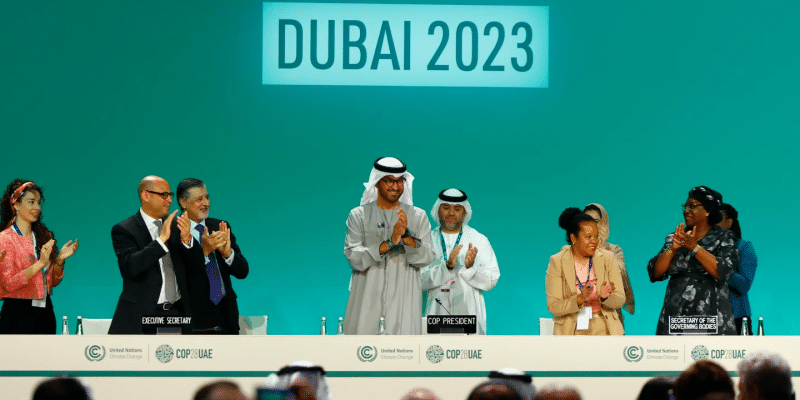The 28th United Nations Conference of the Parties on Climate Change (COP28) ended with an agreement for a transition "away from fossil fuels". The agreement, which provides for a phase-out of fossil fuels by 2050, has been widely welcomed internationally.
After the rejection of the first text, the UAE Presidency of COP28 finally secured an agreement after a long night of negotiations in Dubai. The 21-page text refers to a “shift away from renewable energy” by 2050 and calls for “accelerated global efforts to achieve net-zero energy systems, using zero or low-carbon fuels well before or around the middle of this century“. No details given.
The moment history was made.
⁰Everyone came together from day one. Everyone united, everyone acted and everyone delivered. pic.twitter.com/KYsRN6Bu4K— COP28 UAE (@COP28_UAE) December 13, 2023
At the same time, governments should “phase out as soon as possible inefficient fossil fuel subsidies that do not address energy poverty or ensure equitable transitions”. This proposal is in line with the strategy of the International Monetary Fund (IMF), which is forcing African countries to abandon subsidies on petroleum products. At the beginning of 2023, Cameroon, for example, was forced to abandon certain subsidies, which led to a rise in fuel prices.
The use of transitional energies
While calling for a “tripling of global renewable energy capacity and a doubling of the global average annual rate of improvement of energy efficiency by 2030”, the text remains ambiguous on certain aspects of the energy transition, because for some countries, notably Senegal, gas, which is a fossil fuel, is a transition energy. Other low-carbon fuels can contribute to the expected transition.
Read also- COP28: will the “loss and damage” fund reach the $100 billion mark?
This is the case of hydrogen produced from clean electricity, which the industrial sector is working hard to develop and which is not expected to be produced on a large scale before 2030. Nuclear power, another fossil-based energy source, is also seen as an alternative for limiting global warming. Several African countries are keen to get into this sector. These include Egypt, Rwanda, Ghana, and recently Mali and Burkina Faso, with support from Russia.
Increasing climate finance
On the issue of adaptation, the text calls on developed country Parties to “fully and urgently meet” the target of $100 billion per year until 2025. In addition to the financing of “loss and damage”, for which the dedicated fund was definitively adopted at the start of COP28, the text also stresses that the financing needs of developing countries for adaptation are estimated at 215-387 billion dollars per year until 2030, and that around 4,300 billion dollars per year must be invested in clean energy until 2030, then 5,000 billion dollars per year until 2050, in order to achieve carbon neutrality by 2050.
The implementation of these proposals is necessary to limit global warming to 1.5°C “with no or limited overshoot”. To achieve this, “global greenhouse gas (GHG) emissions must be reduced by 43% by 2030 and by 60% by 2035 compared to 2019 levels, and net zero carbon dioxide emissions must be achieved by 2050”, reads the final document.
"For the first time, the world is committing to transition away from fossil fuels.
This has the potential to be the beginning of a new era.
The post-fossil era."
— President @vonderleyen at the #EPlenary
— European Commission (@EU_Commission) December 13, 2023
This agreement has already provoked a great deal of international reaction. France, Denmark, the European Union (EU) and the United States of America have all hailed the agreement as a step towards mitigating global warming by gradually phasing out the use of fossil fuels, since low-income countries are defending “the right to exploit these resources” for their own development. A number of reactions are expected on the African continent, notably from Senegal and the Democratic Republic of Congo (DRC), which is preparing to exploit its oil and gas deposits, including in the heart of the equatorial forest. The details of these commitments will no doubt be spelled out at COP29, which Azerbaijan will host in 2024.
Jean Marie Takouleu





